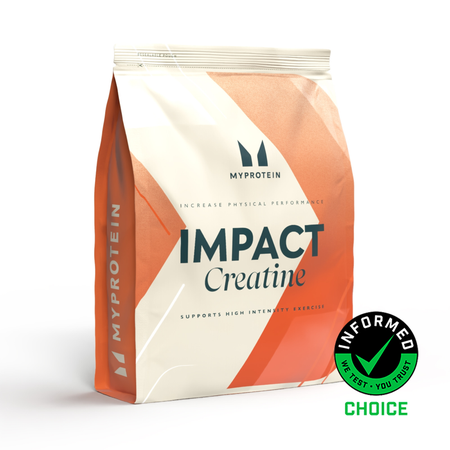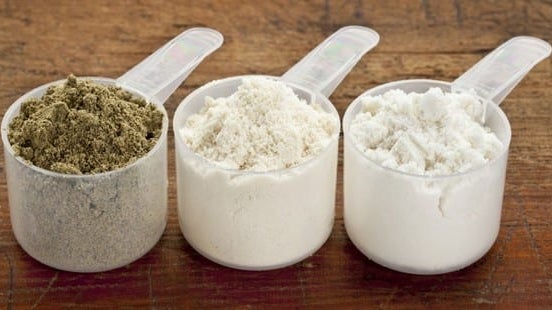
If you’ve spent any time around the weights in a gym, you’ve likely seen or heard people talking about taking creatine. With so much chit chat around this supplement, it might be confusing to figure out exactly when to take it to maximize the benefits. You might not even be sure if you should be taking creatine at all, and if it’s really that useful. So, let us help you figure out what exactly creatine is, and how it can work best for you.
What is creatine?
Why should you take it?
Because creatine is broken down during exercise (about 1-2% of our total muscle stores each day), it is important to replenish the amount you are losing. Taking creatine as a supplement can boost the stores in the muscle and make you able to push harder for faster gains.1 Restoring your creatine levels after a workout is also important for quick recovery and potential injury reduction.1,2
Creatine has shown other benefits in peer reviewed studies, like lower rates of injury, better performance in extreme heat, and increased aerobic threshold.2,3,5
Who is it suitable for?
Creatine is suitable for anyone who wants to optimize their training. There are no contraindications for taking creatine, but some people may benefit more than others. Because creatine is made by our bodies and also ingested in foods like meat and seafood, we all have some stored. But those who follow vegan or vegetarian diets might show greater benefits from taking creatine if their regular diet doesn’t contain much.3
When to take creatine if you’re cycling
Creatine can be useful at any point in your training schedule. If you’re in a cutting phase, taking creatine can help build and preserve the stores in your muscle for your next training cycle. If you’re training hard and trying to bulk, it helps optimize the creatine levels in your muscle tissue to support performance.
How to take it for creatine loading
When you want to load creatine, you take higher doses for several days in a row to maximize the storage in your muscles. You might try creatine loading if you’ve never used it before or haven’t been using it for a while. Once you complete the loading phase, you can drop down to a lower dosage for maintenance. The International Society of Sports Nutrition recommends loading with 0.3g per kg of body weight for at least 3 days and then taking between 3-5 grams per day in the maintenance phase.4
Interested in hearing more on creatine loading? Check out the video below.
Taking creatine on training days
Should you take creatine before or after your workout?
Creatine FAQs
Is it best to take it in the morning or before bed?
Because there is benefit to both before and after exercise supplementation, the time of day does not matter when taking creatine. It is beneficial to boost your stores regardless of the time of day, whenever you can make it a consistent part of your routine, so figure out what’s best for you.
Should you take it with food?
Some research has shown a greater effect of creatine supplementation when combined with carbohydrate fuelling, specifically in aerobic performance.7 If aerobic performance is your goal, take your creatine with a food source of carbohydrate or as part of a pre- or post-workout shake that contains a carb source.
Taking creatine on rest days
Creatine can also be taken on rest days, which will help maximize storage and muscle recovery, especially during a loading phase.
Should you take creatine with water?
Creatine can be taken with water or mixed into another pre- or post-workout shake. While creatine may cause some water retention (it is stored in the muscle tissue which has higher water content than fat tissue), taking it with water does not cause this effect. Water is important for overall hydration regardless of supplementation.
Can you take it with other supplements?
Creatine can easily be taken with other supplements, as it is a naturally occurring substance in our bodies and is not competing for absorption with others. There are no well documented detrimental effects on healthy individuals.4
Take home message
Creatine is a popular supplement that has been repeatedly tested and proven to have ergogenic benefits. While it plays a role in performance and recovery, it can be taken any time of day, regardless of workout timing or the rest of your diet or supplement plan. It also may be even more beneficial if you follow a vegan or vegetarian diet – it’s all about figuring out what’s best for you.
READ THESE NEXT:

Can You Mix Creatine and BCAA?

Get Fruity With Your Creatine | Super-Tasty Smoothie Recipe
What better way to power your progress in the gym?...

- Rodriguez, N. R., DiMarco, N. M., & Langley, S. (2009). Position of the American Dietetic Association, Dietitians of Canada, and the American College of Sports Medicine: Nutrition and athletic performance. Journal of the American Dietetic Association, 109(3), 509-527.
- Harris, R. (2011). Creatine in health, medicine and sport: an introduction to a meeting held at Downing College, University of Cambridge, July 2010.
- Williams, M. H. (1999). Facts and fallacies of purported ergogenic amino acid supplements. Clinics in sports medicine, 18(3), 633-649.
- Kreider, R. B., Kalman, D. S., Antonio, J., Ziegenfuss, T. N., Wildman, R., Collins, R., … & Lopez, H. L. (2017). International Society of Sports Nutrition position stand: safety and efficacy of creatine supplementation in exercise, sport, and medicine. Journal of the International Society of Sports Nutrition, 14(1), 18.
- Demant, T. W., & Rhodes, E. C. (1999). Effects of creatine supplementation on exercise performance. Sports medicine, 28(1), 49-60.
- Williams, M. H. (1999). Facts and fallacies of purported ergogenic amino acid supplements. Clinics in sports medicine, 18(3), 633-649.
- Taylor, L., Poole, C., Pena, E., Lewing, M., Kreider, R., Foster, C., & Wilborn, C. (2011). Effects of combined creatine plus fenugreek extract vs. creatine plus carbohydrate supplementation on resistance training adaptations. Journal of sports science & medicine, 10(2), 254.








